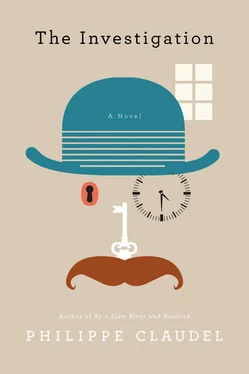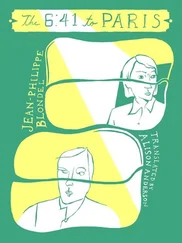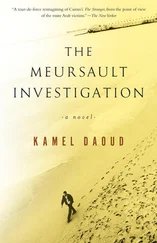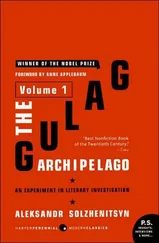“But I’m not asking you for any explanation. I’m not the Policeman, to use your terminology. It’s my job to furnish explanations, that’s what I’m paid to do, not you. Since you respect functions so much, I ask you please not to confuse them, but, rather, tell me about this famous Investigation of yours. Who sent you on this mission?”
“The Head of Section,” the Investigator answered quickly, glad to let the little pair of panties lie forgotten in the Psychologist’s drawer.
“Once again, you’re identifying someone in terms of his function. What’s his name?”
“I don’t know. I have no idea! Among ourselves, we always call him the Head of Section. He’s the Head of Section, and that’s it.”
“When you say ‘Among ourselves,’ to whom are you referring?”
“Well, the others! The other Investigators!”
“There are several of you?”
“Yes.”
“How many?”
“I don’t know the answer to that! Five, six, a dozen, hundreds, or even more, I have no idea. The Head of Section knows. It’s not my job to know!”
“And if I ask you the names of some of the other Investigators, you’ll say …”
“I don’t know their names. I run into them infrequently, I never speak to them, I stay focused on my Investigations.”
The conversation was turning into torture. The Investigator kept getting bogged down in responses that weren’t responses at all. His awareness of this fact had the effect of making him feel even more fragile, and to top it all, he saw the Psychologist’s eyes change and read there the progressive metamorphosis taking place in the professional’s mind. Little by little, the Psychologist was ceasing to consider the Investigator a person somewhat like himself, a person evolving in a relatively normal fashion, though understandably given to some perversions and foibles that were, on the whole, socially and humanly acceptable, and now he was beginning, little by little, to apprehend the Investigator in all his difference, a difference that was obviously pathological, monstrous, a unique case whose study would prove to be, if not exciting, at least completely odd.
“And this Investigation, let’s talk about it. Its object is supposed to be …?” the Psychologist replied, letting his words fly through the air and hang there suspended.
“The Suicides.”
“The Suicides?”
“Yes, the epidemic of Suicides that has struck the Enterprise over the course of the past several months.”
“I’m not familiar with them, and if there’s anyone who should know about such matters, it’s me. Do you have proof of what you’re saying?”
“My Head of Section isn’t in the habit of playing jokes. He has a horror of wasting his time and making his subordinates waste theirs. I have to suppose that if he sent me here to this City to investigate a wave of suicides inside the Enterprise, then that wave exists. And besides — even though I think this is going to make you smile, I’m going to say it anyway, because I’ve reached the point where I no longer have anything left to lose, and certainly not face — I met the Suicides in a dream, and I was able to talk to them. It was right after I ran into the wall.”
The Psychologist took a deep breath, smiled, lifted his arms skyward, and let them fall back to his thighs. “Naturally!” he said.
He put his right hand on the Investigator’s shoulder and patted it a little. It was a slumped, soft shoulder, a shoulder one would have thought had no bones to support it, nothing but fat and atrophied muscles; and it formed part of a maltreated body that had eaten nothing for three days.
“You’ve convinced me,” the Psychologist said. “I’m going to do everything in my power to ensure that you’ll be able to bring your Investigation to a successful conclusion.”
He returned to his desk and wrote a long letter. “A sort of ‘open sesame’ to help you get through doors,” he said. From time to time as he wrote, he would look up and give the Investigator a kindly glance.
Finally feeling reassured, the Investigator was able to relax. He considered himself very close to starting work on his mission in earnest. His confidence returned, and this feeling wasn’t due solely to the comfortable fabric of his thin hospital gown — he ran his fingers over it, first in one direction and then in another, using a slow, caressing motion — or even to the Policeman’s medicine. This temporary fragment of happiness arose from the conclusion he’d come to: You should always play with all your cards on the table, he told himself, it’s the only way to be taken seriously in life, even if the cards sometimes present unseemly figures, blind kings, one-eyed jacks, questionable queens, which can disconcert the strongest among us and make them mistrust the hand they’ve been dealt. Fortunately, however, there are individuals who think beyond appearances. And the Investigator, while reflecting upon all those things, admired the features of the Psychologist, bent over his desk, as we admire the men and women who comfort us in our existence.
THE PSYCHOLOGIST HAD SEALED the envelope, and it wouldn’t have occurred to the Investigator to open the letter and read it, because the Psychologist had addressed the envelope in such a way that the bearer was simultaneously comforted and interdicted from looking inside. The large capital letters, written in a self-assured hand that brooked no opposition and contained no trace of hesitation, read: TO THE FOUNDER.
The Investigator was sitting in a sort of waiting room. The Psychologist had led him there, very kindly assisting his every step along the way, as if he were quite ill, when in reality — if he excepted the pain still drilling inside his head, and even that was beginning to abate — his general condition seemed to him to be pretty satisfactory. His hunger had stopped tormenting him, and he wasn’t even thirsty.
“Take a seat,” the Psychologist had said. “I’m going to look for, I’m going to look for … ah, what should I call them? Something you’d like …” He’d hesitated a moment with his left index finger on his lips as he contemplated the Investigator. “How about ‘Escorts’? Would that be all right with you, Escorts?”
“Escorts? But that’s perfect!” the Investigator had seen fit to reply. The very term, “Escort,” resonated reassuringly in his mind.
“They’ll take you to where the … Founder is. I’m certain he’ll be very happy to meet you.”
The Investigator had thanked the Psychologist, who had thereupon exited, leaving him in the company of a green plant, a water fountain — dry — and a pile of magazines placed on a low table. The Waiting Room was violently lighted and windowless. Like the Psychologist’s office as well as the corridors they’d passed through, it was white, entirely white, its walls and floor covered with the same smooth yet spongy material that absorbed shocks as well as sounds.
As he looked at the floor and the walls and the violent light, as he remembered the Psychologist’s words and the way he’d looked at him and listened to him, the Investigator suddenly felt an insidious malaise, to which, at first, he paid no attention. It was like an idea scratching at a distant door in a dwelling that comprised dozens of rooms and dozens of doors. Or, to transcribe another image that occurred to the Investigator, it was as if a person in a room on the fourth floor of a building had the impression that someone had just pressed the doorbell button outside the main door, but so briefly, so fleetingly, that the person in the fourth-floor apartment doesn’t know if he heard the sound or imagined it. In any case, however, his perception of things is modified by it, he’s no longer the same as he was a few seconds before the real or hypothetical ringing of the doorbell, and the actions he undertakes in the future will be influenced, one way or another, by what he heard or thought he heard.
Читать дальше












